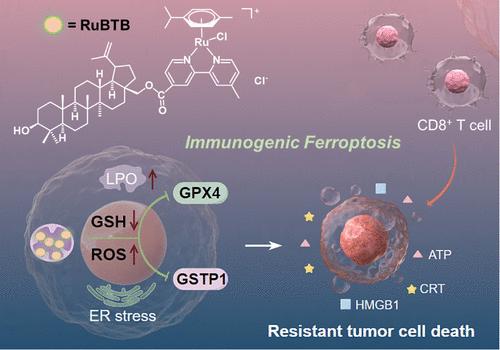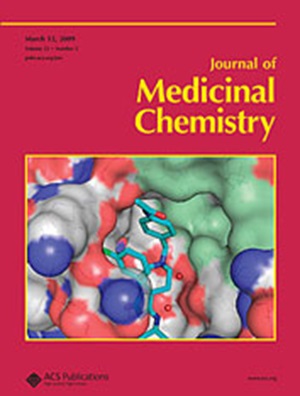Ruthenium(ii)–Arene Complex Triggers Immunogenic Ferroptosis for Reversing Drug Resistance
IF 6.8
1区 医学
Q1 CHEMISTRY, MEDICINAL
引用次数: 0
Abstract
Chemoresistance remains an arduous challenge in oncology, but ferroptosis shows potential for overcoming it by stimulating the immune system. Herein, a novel high-performance ruthenium(II)-based arene complex [Ru(η6-p-cym)(BTBpy)Cl] (RuBTB) is developed for ferroptosis-enhanced antitumor immunity and drug resistance reversal via glutathione (GSH) metabolism imbalance. RuBTB shows significantly enhanced antiproliferation activity against cisplatin (CDDP)-resistant lung cancer cells (A549R), with 26.35-fold better anticancer effects than CDDP. Immunogenic ferroptosis is induced by GSH depletion/glutathione peroxidase 4 (GPX4) inactivation, mitochondrial dysfunction, and endoplasmic reticulum (ER) stress in RuBTB-treated cells. Mechanism studies indicate that RuBTB regulates ferroptosis and immune-related pathways, coordinating with GSH metabolism-mediated glutathione S-transferase (GST) inhibition to reverse drug resistance in platinum-combined therapy. Tumor vaccination experiments demonstrate the intensified antitumor effects endowed by highly immunogenic ferroptosis in vivo. This study provides the first example of a metal–arene complex for achieving satisfactory ferroptosis therapeutic effects with efficient immunogenicity to overcome drug resistance in metal-based immunochemotherapy.

钌(ii)-芘复合物触发免疫性铁跃迁以逆转耐药性
化疗抗药性仍然是肿瘤学领域的一项艰巨挑战,但铁氧体渗透却显示出通过刺激免疫系统克服化疗抗药性的潜力。本文开发了一种新型高性能钌(II)基炔络合物[Ru(η6-p-cym)(BTBpy)Cl](RuBTB),用于通过谷胱甘肽(GSH)代谢失衡增强铁突变的抗肿瘤免疫和耐药性逆转。RuBTB 对顺铂(CDDP)耐药肺癌细胞(A549R)的抗增殖活性明显增强,抗癌效果是 CDDP 的 26.35 倍。在 RuBTB 处理的细胞中,GSH 消耗/谷胱甘肽过氧化物酶 4 (GPX4) 失活、线粒体功能障碍和内质网 (ER) 应激诱导了免疫性铁中毒。机理研究表明,RuBTB 可调节铁变态反应和免疫相关途径,与 GSH 代谢介导的谷胱甘肽 S 转移酶(GST)抑制相协调,从而逆转铂类联合疗法的耐药性。肿瘤疫苗接种实验证明,体内高免疫原性铁蛋白能增强抗肿瘤效果。这项研究首次提供了金属-烯烃复合物的范例,该复合物可在金属基免疫化疗中克服耐药性,同时具有高效的免疫原性,从而达到令人满意的铁肽化治疗效果。
本文章由计算机程序翻译,如有差异,请以英文原文为准。
求助全文
约1分钟内获得全文
求助全文
来源期刊

Journal of Medicinal Chemistry
医学-医药化学
CiteScore
4.00
自引率
11.00%
发文量
804
审稿时长
1.9 months
期刊介绍:
The Journal of Medicinal Chemistry is a prestigious biweekly peer-reviewed publication that focuses on the multifaceted field of medicinal chemistry. Since its inception in 1959 as the Journal of Medicinal and Pharmaceutical Chemistry, it has evolved to become a cornerstone in the dissemination of research findings related to the design, synthesis, and development of therapeutic agents.
The Journal of Medicinal Chemistry is recognized for its significant impact in the scientific community, as evidenced by its 2022 impact factor of 7.3. This metric reflects the journal's influence and the importance of its content in shaping the future of drug discovery and development. The journal serves as a vital resource for chemists, pharmacologists, and other researchers interested in the molecular mechanisms of drug action and the optimization of therapeutic compounds.
 求助内容:
求助内容: 应助结果提醒方式:
应助结果提醒方式:


